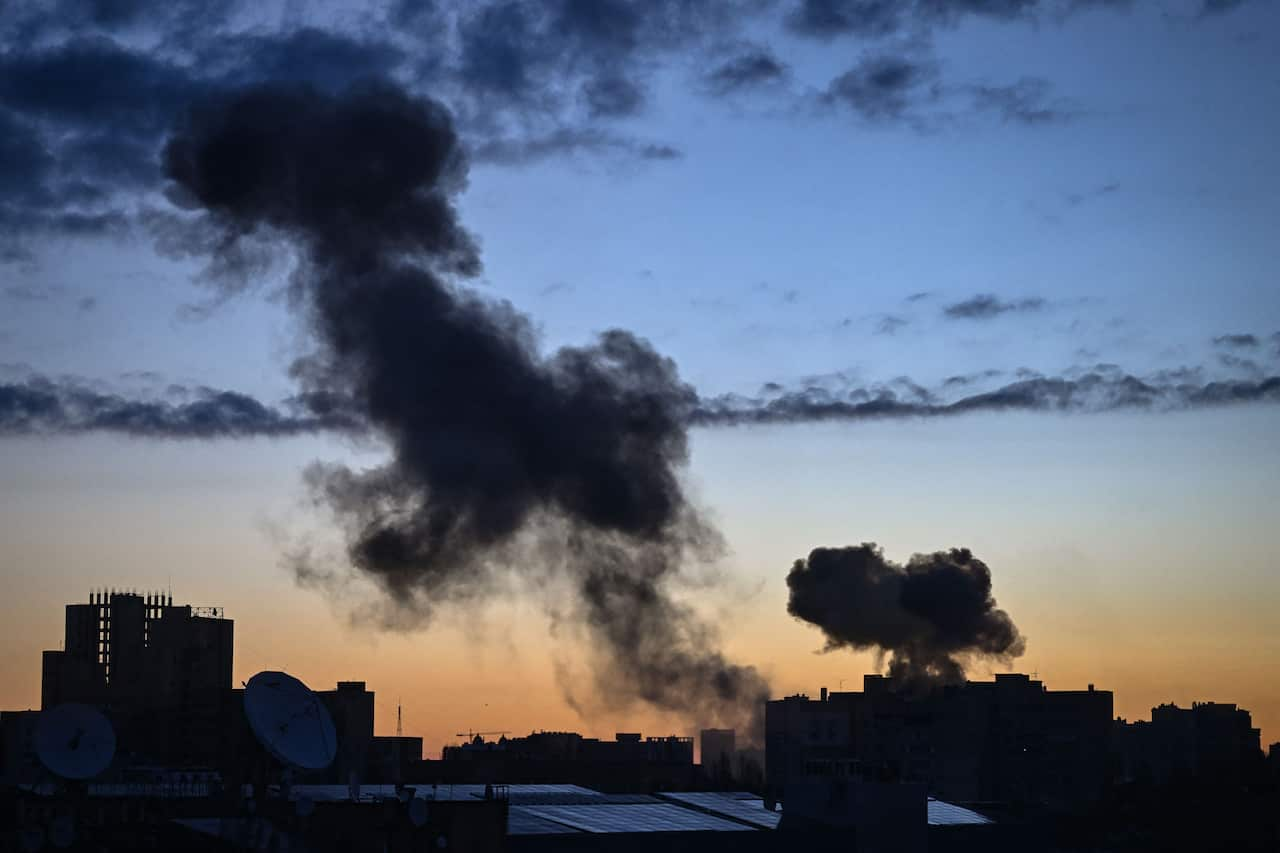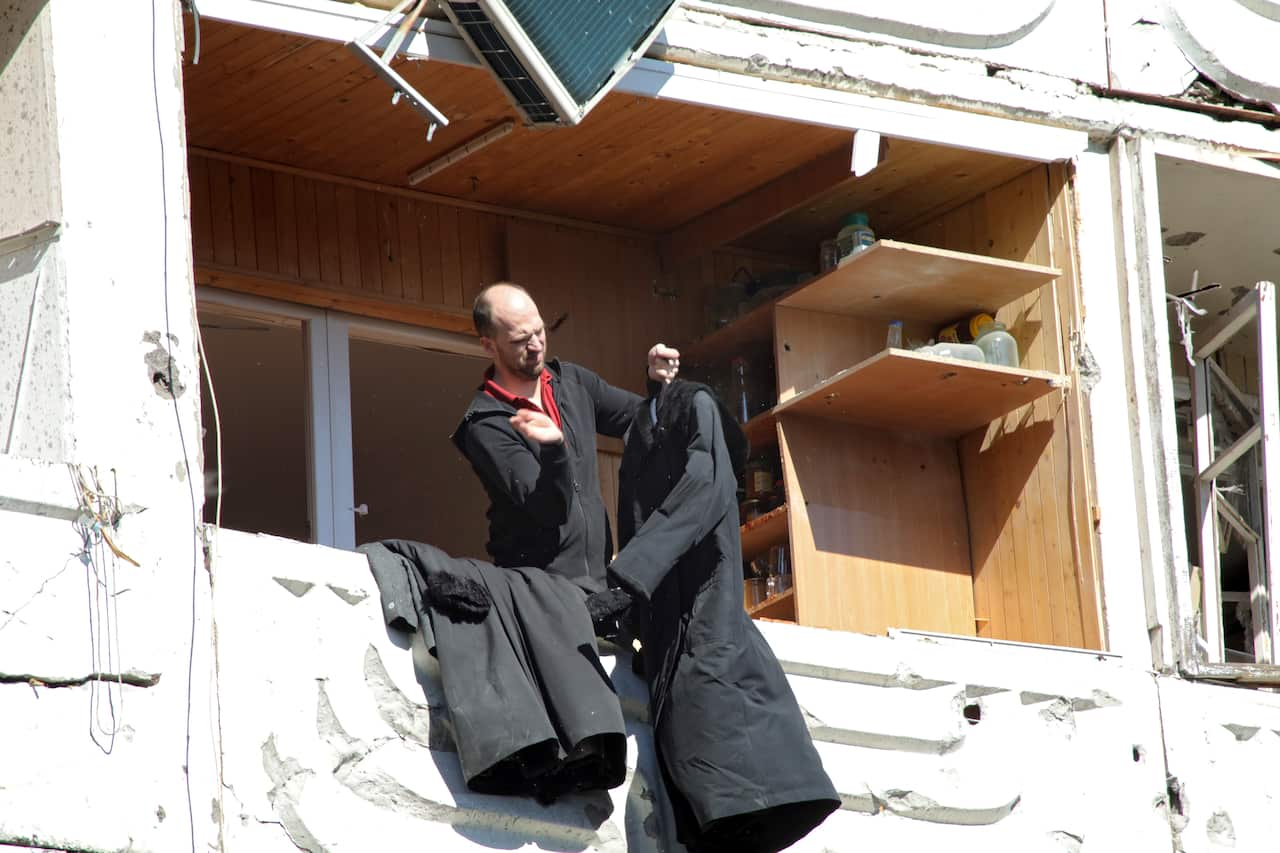The United States and other NATO members said on Wednesday they would keep helping Ukraine fight off Russia's invasion, while also adapting the alliance's own security to the "new reality" triggered by the war.
Diplomats and military analysts estimate that NATO allies have sent more than 20,000 anti-tank and other weapons to Ukraine since the invasion started on 24 February.
"We remain united in our support of Ukraine," US Defense Secretary Lloyd Austin said as he arrived at an emergency meeting of NATO defence ministers in Brussels. "We support their ability to defend themselves and will continue to support them."
Mr Austin's comments came as several new explosions rocked Kyiv on Wednesday, according to AFP journalists in the city, with emergency services saying two residential buildings were damaged and two people wounded.
The Ukrainian capital was placed under curfew on Tuesday due to what its mayor called a "difficult and dangerous moment".
At least three loud explosions were heard just after dawn in the western part of the city, and thick clouds of smoke billowed into the sky.
"Two residential buildings were damaged in an overnight bombardment in the central part of Kyiv, Shevchenkivskyi district. Two people reported wounded, 35 evacuated," the Ukrainian state emergency service said on Telegram.
Images released by the emergency services showed the top corner of one building had been partially destroyed, while the other had damage and scorch marks to its roof and upper part.

This photograph taken on 16 March 2022 shows smoke rising after an explosion in Kyiv. Source: AFP / ARIS MESSINIS/AFP via Getty Images
At least four people were killed and 40 injured in a Russian strike that set a building on fire in Kyiv's Sviatoshynsky district on Tuesday. Several other buildings were also hit.
Nearly three weeks after the invasion of Ukraine, Russian forces hemming in Kyiv on two sides have stepped up their attacks, with many in the capital fearing a full-on assault could come soon.
Battles continue to rage in cities like Mariupol, Kharkhiv and Mykolaiv, as well as in suburban towns just outside Kyiv.
NATO countries will continue to deliver weapons to Ukraine even as those deliveries could become the target of Russian attacks, Dutch defence minister Kajsa Ollongren told reporters, adding: "Ukraine has the right to defend itself."
Ukraine is not a member of NATO.
Although it has repeatedly said it wants to join to benefit from its protection, Kyiv said on Tuesday it understood it does not have an open door to NATO membership and was seeking other types of security guarantees.
Eastern flank
While at least 10 of NATO's biggest member states, including the US, Britain and France, have deployed more troops, ships and warplanes to its eastern flank and put more on stand-by, the alliance must still consider how to face up to a new security situation in Europe over the medium term.
"We need to reset our military posture for this new reality," NATO Secretary General Jens Stoltenberg said on Tuesday. "Ministers will start an important discussion on concrete measures to reinforce our security for the longer term, in all domains."
Russian missiles hit a Ukrainian base near the border with NATO member Poland on 13 March, bringing the invasion right up to NATO's doorstep.
Those missiles were fired from Russia, the US has said, underscoring Moscow's ability to hit NATO's eastern allies. The US has also warned of undefined consequences for Moscow if Russia were to launch a chemical attack in Ukraine.

A man beats on the damaged balcony in a ten-storey apartment block affected by a shelling that took place early in the morning on Tuesday 15 March. Credit: Future Publishing/Future Publishing via Getty Imag
However, diplomats say NATO wants to avoid directly stating its plans, or what would trigger its "Article 5" collective defence pledge, saying "strategic ambiguity" is also a defensive instrument against any Russian aggression.
"The surprise for [Russian President Vladimir] Putin was the West was so united. He didn't believe that. He has the wrong picture about western countries," Estonian Defense Minister Kalle Laanet said as he arrived at the NATO meeting.
"We can't be afraid, we have to stay calm, because Putin would like to see that everybody is afraid."
Share



